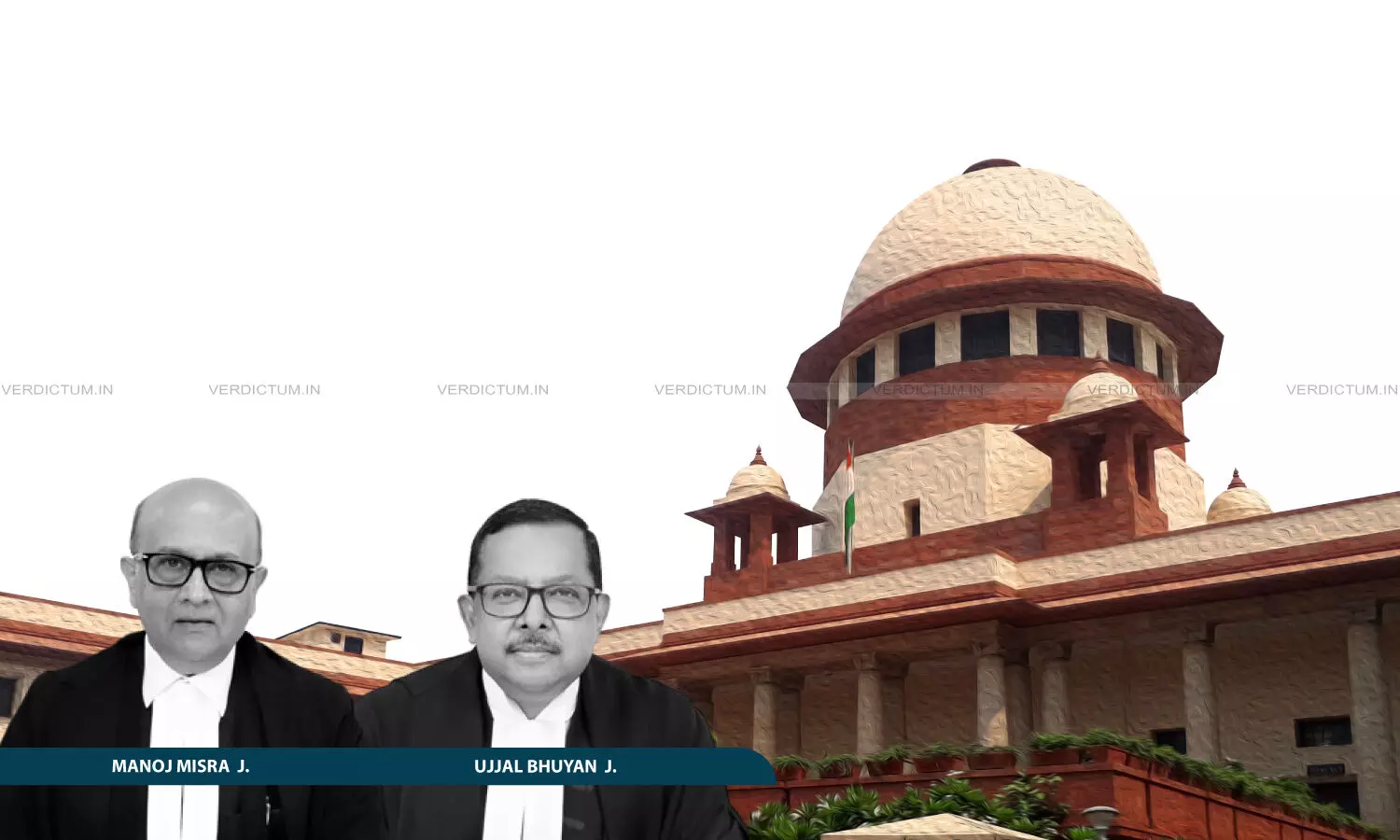
Justice Manoj Misra, Justice Ujjal Bhuyan, Supreme Court
Rigor Of S.19(1) NGT Act Can’t Be Stretched To Abandon Statutory Procedure U/S 21 & 22 Of Water Act: Supreme Court
 |
|The Supreme Court allowed Civil Appeals preferred under Section 22 of the NGT Act, challenging the Orders of the NGT, Principal Bench, New Delhi.
The Supreme Court held that the rigor of Section 19(1) of the National Green Tribunal Act, 2010 (NGT Act) cannot be stretched to abandon the statutory procedure laid down under Sections 21 and 22 of the Water (Prevention and Control of Pollution) Act, 1974.
The Court held thus in Civil Appeals preferred under Section 22 of the NGT Act, challenging the Orders of the NGT, Principal Bench, New Delhi.
The two-Judge Bench comprising Justice Manoj Misra and Justice Ujjal Bhuyan observed, “NGT exercises judicial functions. Therefore, it is all the more necessary for the NGT to adhere to a fair procedure which is statutorily laid down of which principles of natural justice are an inalienable part. Rigor of Section 19(1) of the National Green Tribunal Act, 2010 is qua the procedure to be adopted by the NGT in conducting its proceedings. It cannot be stretched to abandon the statutory procedure laid dow nunder Sections 21 and 22 of the Water Act and by outsourcing investigation to administrative committees by overlooking the statutory provisions and basing its decisions on the recommendation of such administrative committee. This is not within the remit of NGT.”
Senior Advocate Kavin Gulati represented the Appellant while AOR Sudeep Kumar represented the Respondents.
Brief Facts
The Appellant, a public limited company was engaged in diverse business activities including manufacture of sugar. It had seven sugar manufacturing units across the State of Uttar Pradesh. In 1952, the Appellant had acquired the sugar manufacturing unit at a village. In 2021, The Respondent filed a Complaint before the NGT alleging that the sugar mill of the Appellant was discharging untreated waste in a particular drain resulting in contamination of ground water in an area of about one and a half kilometer around the sugar mill having depth upto 50 metres. The NGT constituted a joint committee of Central Pollution Control Board (CPCB), Uttar Pradesh Pollution Control Board (UPPCB) and District Magistrate (DM), Muzaffarnagar and directed to conduct inspection and file status report.
The committee stated that because of various reasons including conclusion of the sugarcane crushing season and the sugar mill remaining closed due to COVID pandemic, inspection could not be carried out and prayed for further time. Thereafter, regional office of UPPCB carried out inspection and observed that no contamination was found in the ground water samples. NGT was not satisfied with the stand of UPPCB and hence, directed the committee to conduct inspection when unit was functional. After the report was submitted, the NGT held that the Appellant had violated the environmental norms and directed the committee to submit a supplementary report. In its second Order, it directed that compensation of Rs. 18 crores at the rate of 2% of annual turnover may be deposited by the Appellant. This was under challenge before the Apex Court.
Reasoning
The Supreme Court in view of the above facts, noted, “From the conspectus of facts and law, it is clearly evident that the impugned orders are in complete violation of the procedures laid down in the Water (Prevention and Control of Pollution) Act, 1974, the Environment (Protection) Act, 1986, more particularly Sections 21 and 22 of the Water Act and the National Green Tribunal Act, 2010, including Section 19 thereof.”
The Court said that the impugned decisions which entail adverse civil consequences upon the Appellant were passed without following the due procedure laid down under the statute as well as the elementary principles of natural justice.
“We, therefore, have no hesitation in declaring such orders to be illegal and null and void”, it added.
The Court remarked that this is a classic case where in the quest for doing justice, NGT has ended up doing just the reverse.
“Ordinarily, in a case where there is violation of the principles of natural justice, parties are relegated to the adjudicatory forum to re-do the exercise after following the due process. But in this case, the entire exercise has been vitiated because of non-conforming to the laid down procedure contemplated under Sections 21 and 22 of the Water (Prevention and Control of Pollution) Act, 1974”, it further observed.
The Court, therefore, concluded that relegating the parties back to the NGT would serve no useful purpose. It also clarified that it will always be open to the UPPCB to carry out inspection and take remedial measures qua the sugar mill of the Appellant by following the procedure laid down under the Water Act and after complying with the due process statutorily laid down thereunder, including by adhering to the principles of natural justice.
Accordingly, the Apex Court allowed the Appeals and set aside the NGT’s Orders.
Cause Title- M/s Triveni Engineering and Industries Ltd. v. State of Uttar Pradesh & Ors. (Neutral Citation: 2025 INSC 1060)
Appearance:
Appellant: Senior Advocate Kavin Gulati, AOR E. C. Agrawala, Advocates Mahesh Agarwal, Ruchir Ranjan Rai, Ankur Saigal, Prateek Kumar, Arshit Anand, Vidisha Swarup, and Naman Gupta.
Respondents: AORs Sudeep Kumar and Pradeep Misra.